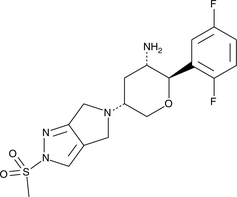Cayman
Showing 29551–29700 of 45550 results
-
MJ15 is a potent antagonist of the cannabinoid (CB) receptor CB1 (IC50 = 118.9 pM; Ki = 27.2 pM for rat CB1).{32932} It is selective for CB1 over CB2, exhibiting only 46% inhibition of CB2 at a concentration of 10 μM. MJ15 reverses (+)-WIN 55,212-2 (Item No. 10009023) inhibition of forskolin-induced cAMP accumulation in a dose-dependent manner in CHO cells expressing human CB1. MJ15 (40 mg/kg) reduces food intake and body weight gain in a rat model of diet-induced obesity. It also reduces body weight gain and white adipose accumulation in a mouse model of early onset diet-induced obesity.
Brand:CaymanSKU:11956 - 25 mgAvailable on backorder
MJ15 is a potent antagonist of the cannabinoid (CB) receptor CB1 (IC50 = 118.9 pM; Ki = 27.2 pM for rat CB1).{32932} It is selective for CB1 over CB2, exhibiting only 46% inhibition of CB2 at a concentration of 10 μM. MJ15 reverses (+)-WIN 55,212-2 (Item No. 10009023) inhibition of forskolin-induced cAMP accumulation in a dose-dependent manner in CHO cells expressing human CB1. MJ15 (40 mg/kg) reduces food intake and body weight gain in a rat model of diet-induced obesity. It also reduces body weight gain and white adipose accumulation in a mouse model of early onset diet-induced obesity.
Brand:CaymanSKU:11956 - 5 mgAvailable on backorder
Peroxiredoxin-6 (Prdx6) is a bifunctional enzyme that has both non-selenium glutathione peroxidase (GPX) and phospholipase A2 (PLA2) activities.{9012} Its PLA2 activity is calcium-independent, functions optimally in acidic (pH = 4) conditions, and facilitates the intracellular processing of surfactant lipids, including dipalmitoylphosphatidylcholine (DPPC).{9012,27803,5680} MJ33 is a selective, reversible inhibitor of the acidic, calcium-independent (ai)PLA2 activity of Prdx6, with optimal inhibition achieved at an MJ33 concentration of 3 mol%.{3982,3927,27802} It blocks the degradation of DPPC in both whole lung and isolated alveolar type II epithelial cells.{27803} MJ33 has been used to examine the role of Prdx6 PLA2 activity in the activation of type 2 NADPH oxidase and in the regulation of Prdx6 PLA2 activity by phosphorylation.{27804,27805}
Brand:CaymanSKU:90001844 - 1 mgAvailable on backorder
Peroxiredoxin-6 (Prdx6) is a bifunctional enzyme that has both non-selenium glutathione peroxidase (GPX) and phospholipase A2 (PLA2) activities.{9012} Its PLA2 activity is calcium-independent, functions optimally in acidic (pH = 4) conditions, and facilitates the intracellular processing of surfactant lipids, including dipalmitoylphosphatidylcholine (DPPC).{9012,27803,5680} MJ33 is a selective, reversible inhibitor of the acidic, calcium-independent (ai)PLA2 activity of Prdx6, with optimal inhibition achieved at an MJ33 concentration of 3 mol%.{3982,3927,27802} It blocks the degradation of DPPC in both whole lung and isolated alveolar type II epithelial cells.{27803} MJ33 has been used to examine the role of Prdx6 PLA2 activity in the activation of type 2 NADPH oxidase and in the regulation of Prdx6 PLA2 activity by phosphorylation.{27804,27805}
Brand:CaymanSKU:90001844 - 10 mgAvailable on backorder
Peroxiredoxin-6 (Prdx6) is a bifunctional enzyme that has both non-selenium glutathione peroxidase (GPX) and phospholipase A2 (PLA2) activities.{9012} Its PLA2 activity is calcium-independent, functions optimally in acidic (pH = 4) conditions, and facilitates the intracellular processing of surfactant lipids, including dipalmitoylphosphatidylcholine (DPPC).{9012,27803,5680} MJ33 is a selective, reversible inhibitor of the acidic, calcium-independent (ai)PLA2 activity of Prdx6, with optimal inhibition achieved at an MJ33 concentration of 3 mol%.{3982,3927,27802} It blocks the degradation of DPPC in both whole lung and isolated alveolar type II epithelial cells.{27803} MJ33 has been used to examine the role of Prdx6 PLA2 activity in the activation of type 2 NADPH oxidase and in the regulation of Prdx6 PLA2 activity by phosphorylation.{27804,27805}
Brand:CaymanSKU:90001844 - 25 mgAvailable on backorder
Peroxiredoxin-6 (Prdx6) is a bifunctional enzyme that has both non-selenium glutathione peroxidase (GPX) and phospholipase A2 (PLA2) activities.{9012} Its PLA2 activity is calcium-independent, functions optimally in acidic (pH = 4) conditions, and facilitates the intracellular processing of surfactant lipids, including dipalmitoylphosphatidylcholine (DPPC).{9012,27803,5680} MJ33 is a selective, reversible inhibitor of the acidic, calcium-independent (ai)PLA2 activity of Prdx6, with optimal inhibition achieved at an MJ33 concentration of 3 mol%.{3982,3927,27802} It blocks the degradation of DPPC in both whole lung and isolated alveolar type II epithelial cells.{27803} MJ33 has been used to examine the role of Prdx6 PLA2 activity in the activation of type 2 NADPH oxidase and in the regulation of Prdx6 PLA2 activity by phosphorylation.{27804,27805}
Brand:CaymanSKU:90001844 - 5 mgAvailable on backorder
Endocannabinoids such as 2-arachidonoyl glycerol (2-AG; Item No. 62160) and arachidonoyl ethanolamide (AEA; Item No. 90050) are biologically active lipids that are involved in a number of synaptic processes including activation of cannabinoid receptors. Monoacylglycerol lipase (MAGL) is a serine hydrolase responsible for the hydrolysis of 2-AG to arachidonic acid (Item No. 90010) and glycerol, thus terminating its biological function. MJN110 is an N-hydroxysuccinimidyl carbamate that inhibits MAGL (IC50 = 9.1 nM) and to a lesser extent ABHD6 with potent selectivity over FAAH (IC50 > 10 µM) and other brain serine hydrolases.{28778} It can inhibit 2-AG hydrolysis (IC50 = 2.1 nM) with no effect on AEA hydrolysis up to 50 µM.{28778} At 5 mg/kg, MJN110 has been shown to alleviate mechanical allodynia in a rat model of diabetic neuropathy.{28778}
Brand:CaymanSKU:-Available on backorder
Endocannabinoids such as 2-arachidonoyl glycerol (2-AG; Item No. 62160) and arachidonoyl ethanolamide (AEA; Item No. 90050) are biologically active lipids that are involved in a number of synaptic processes including activation of cannabinoid receptors. Monoacylglycerol lipase (MAGL) is a serine hydrolase responsible for the hydrolysis of 2-AG to arachidonic acid (Item No. 90010) and glycerol, thus terminating its biological function. MJN110 is an N-hydroxysuccinimidyl carbamate that inhibits MAGL (IC50 = 9.1 nM) and to a lesser extent ABHD6 with potent selectivity over FAAH (IC50 > 10 µM) and other brain serine hydrolases.{28778} It can inhibit 2-AG hydrolysis (IC50 = 2.1 nM) with no effect on AEA hydrolysis up to 50 µM.{28778} At 5 mg/kg, MJN110 has been shown to alleviate mechanical allodynia in a rat model of diabetic neuropathy.{28778}
Brand:CaymanSKU:-Available on backorder
Endocannabinoids such as 2-arachidonoyl glycerol (2-AG; Item No. 62160) and arachidonoyl ethanolamide (AEA; Item No. 90050) are biologically active lipids that are involved in a number of synaptic processes including activation of cannabinoid receptors. Monoacylglycerol lipase (MAGL) is a serine hydrolase responsible for the hydrolysis of 2-AG to arachidonic acid (Item No. 90010) and glycerol, thus terminating its biological function. MJN110 is an N-hydroxysuccinimidyl carbamate that inhibits MAGL (IC50 = 9.1 nM) and to a lesser extent ABHD6 with potent selectivity over FAAH (IC50 > 10 µM) and other brain serine hydrolases.{28778} It can inhibit 2-AG hydrolysis (IC50 = 2.1 nM) with no effect on AEA hydrolysis up to 50 µM.{28778} At 5 mg/kg, MJN110 has been shown to alleviate mechanical allodynia in a rat model of diabetic neuropathy.{28778}
Brand:CaymanSKU:-Available on backorder
Endocannabinoids such as 2-arachidonoyl glycerol (2-AG; Item No. 62160) and arachidonoyl ethanolamide (AEA; Item No. 90050) are biologically active lipids that are involved in a number of synaptic processes including activation of cannabinoid receptors. Monoacylglycerol lipase (MAGL) is a serine hydrolase responsible for the hydrolysis of 2-AG to arachidonic acid (Item No. 90010) and glycerol, thus terminating its biological function. MJN110 is an N-hydroxysuccinimidyl carbamate that inhibits MAGL (IC50 = 9.1 nM) and to a lesser extent ABHD6 with potent selectivity over FAAH (IC50 > 10 µM) and other brain serine hydrolases.{28778} It can inhibit 2-AG hydrolysis (IC50 = 2.1 nM) with no effect on AEA hydrolysis up to 50 µM.{28778} At 5 mg/kg, MJN110 has been shown to alleviate mechanical allodynia in a rat model of diabetic neuropathy.{28778}
Brand:CaymanSKU:-Available on backorder
MJN228 is a selective ligand for the lipid-binding protein nucleobindin 1 (NUCB1), blocking binding of the probe arachidonoyl ethanolamide-diazirine with an IC50 value of 3.3 µM.{29287} It prevents probe binding to NUCB1 in Neuro2a cells at concentrations as low as 10 µM. MJN228 has been used to elucidate the role of NUCB1 in lipid metabolic pathways in cells.{29287}
Brand:CaymanSKU:-Available on backorder
MJN228 is a selective ligand for the lipid-binding protein nucleobindin 1 (NUCB1), blocking binding of the probe arachidonoyl ethanolamide-diazirine with an IC50 value of 3.3 µM.{29287} It prevents probe binding to NUCB1 in Neuro2a cells at concentrations as low as 10 µM. MJN228 has been used to elucidate the role of NUCB1 in lipid metabolic pathways in cells.{29287}
Brand:CaymanSKU:-Available on backorder
MJN228 is a selective ligand for the lipid-binding protein nucleobindin 1 (NUCB1), blocking binding of the probe arachidonoyl ethanolamide-diazirine with an IC50 value of 3.3 µM.{29287} It prevents probe binding to NUCB1 in Neuro2a cells at concentrations as low as 10 µM. MJN228 has been used to elucidate the role of NUCB1 in lipid metabolic pathways in cells.{29287}
Brand:CaymanSKU:-Available on backorder
MJN228 is a selective ligand for the lipid-binding protein nucleobindin 1 (NUCB1), blocking binding of the probe arachidonoyl ethanolamide-diazirine with an IC50 value of 3.3 µM.{29287} It prevents probe binding to NUCB1 in Neuro2a cells at concentrations as low as 10 µM. MJN228 has been used to elucidate the role of NUCB1 in lipid metabolic pathways in cells.{29287}
Brand:CaymanSKU:-Available on backorder
The Aurora kinases (A, B, and C) are a family of serine-threonine kinases that regulate various stages of mitotic function. With significant roles in cell cycle and cell division, Aurora kinase gene amplification and overexpression are linked to tumorigenesis.{18438} MK-0457 is a potent pan-Aurora kinase inhibitor but favors Aurora A (Ki = 0.6 nM) over Aurora B (Ki = 18 nM) or Aurora C (Ki = 4.6 nM).{17545} It shows selectivity against a panel of more than 190 different protein kinases.{17545} MK-0457 effectively inhibits proliferation of several different cell lines of clear cell renal carcinoma (IC50s = 2/M phase.{18438}
Brand:CaymanSKU:-The Aurora kinases (A, B, and C) are a family of serine-threonine kinases that regulate various stages of mitotic function. With significant roles in cell cycle and cell division, Aurora kinase gene amplification and overexpression are linked to tumorigenesis.{18438} MK-0457 is a potent pan-Aurora kinase inhibitor but favors Aurora A (Ki = 0.6 nM) over Aurora B (Ki = 18 nM) or Aurora C (Ki = 4.6 nM).{17545} It shows selectivity against a panel of more than 190 different protein kinases.{17545} MK-0457 effectively inhibits proliferation of several different cell lines of clear cell renal carcinoma (IC50s = 2/M phase.{18438}
Brand:CaymanSKU:-The Aurora kinases (A, B, and C) are a family of serine-threonine kinases that regulate various stages of mitotic function. With significant roles in cell cycle and cell division, Aurora kinase gene amplification and overexpression are linked to tumorigenesis.{18438} MK-0457 is a potent pan-Aurora kinase inhibitor but favors Aurora A (Ki = 0.6 nM) over Aurora B (Ki = 18 nM) or Aurora C (Ki = 4.6 nM).{17545} It shows selectivity against a panel of more than 190 different protein kinases.{17545} MK-0457 effectively inhibits proliferation of several different cell lines of clear cell renal carcinoma (IC50s = 2/M phase.{18438}
Brand:CaymanSKU:-The Aurora kinases (A, B, and C) are a family of serine-threonine kinases that regulate various stages of mitotic function. With significant roles in cell cycle and cell division, Aurora kinase gene amplification and overexpression are linked to tumorigenesis.{18438} MK-0457 is a potent pan-Aurora kinase inhibitor but favors Aurora A (Ki = 0.6 nM) over Aurora B (Ki = 18 nM) or Aurora C (Ki = 4.6 nM).{17545} It shows selectivity against a panel of more than 190 different protein kinases.{17545} MK-0457 effectively inhibits proliferation of several different cell lines of clear cell renal carcinoma (IC50s = 2/M phase.{18438}
Brand:CaymanSKU:-MK-0524 is a potent, selective prostaglandin D2 (PGD2)receptor DP1 antagonist with Ki values of 0.57 nM and 0.75 µM for the DP1 and DP2 receptors, respectively.{14713} It inhibits PGD2-induced accumulation of cAMP in both washed platelets and platelet-rich plasma with IC50 values of 0.09 and 4.0 nM, respectively.{14713} In a sheep model of allergic rhinitis, 0.1 mg/kg MK-0524 completely blocked PGD2-induced nasal congestion.{14713} At a dose of 4 mg/kg, MK-0524 suppressed a nicotinic acid-induced vasodilatory response by 80% in a mouse model of flushing, an undesirable side-effect of niacin treatment for dyslipidemia.{15245} In an in vitro model of amyotrophic lateral sclerosis, MK-0524 has been shown to partially protect cultured motor neurons from PGD2-induced toxicity.{33495,33496}
Brand:CaymanSKU:10009835 - 1 mgAvailable on backorder
MK-0524 is a potent, selective prostaglandin D2 (PGD2)receptor DP1 antagonist with Ki values of 0.57 nM and 0.75 µM for the DP1 and DP2 receptors, respectively.{14713} It inhibits PGD2-induced accumulation of cAMP in both washed platelets and platelet-rich plasma with IC50 values of 0.09 and 4.0 nM, respectively.{14713} In a sheep model of allergic rhinitis, 0.1 mg/kg MK-0524 completely blocked PGD2-induced nasal congestion.{14713} At a dose of 4 mg/kg, MK-0524 suppressed a nicotinic acid-induced vasodilatory response by 80% in a mouse model of flushing, an undesirable side-effect of niacin treatment for dyslipidemia.{15245} In an in vitro model of amyotrophic lateral sclerosis, MK-0524 has been shown to partially protect cultured motor neurons from PGD2-induced toxicity.{33495,33496}
Brand:CaymanSKU:10009835 - 10 mgAvailable on backorder
MK-0524 is a potent, selective prostaglandin D2 (PGD2)receptor DP1 antagonist with Ki values of 0.57 nM and 0.75 µM for the DP1 and DP2 receptors, respectively.{14713} It inhibits PGD2-induced accumulation of cAMP in both washed platelets and platelet-rich plasma with IC50 values of 0.09 and 4.0 nM, respectively.{14713} In a sheep model of allergic rhinitis, 0.1 mg/kg MK-0524 completely blocked PGD2-induced nasal congestion.{14713} At a dose of 4 mg/kg, MK-0524 suppressed a nicotinic acid-induced vasodilatory response by 80% in a mouse model of flushing, an undesirable side-effect of niacin treatment for dyslipidemia.{15245} In an in vitro model of amyotrophic lateral sclerosis, MK-0524 has been shown to partially protect cultured motor neurons from PGD2-induced toxicity.{33495,33496}
Brand:CaymanSKU:10009835 - 25 mgAvailable on backorder
MK-0524 is a potent, selective prostaglandin D2 (PGD2)receptor DP1 antagonist with Ki values of 0.57 nM and 0.75 µM for the DP1 and DP2 receptors, respectively.{14713} It inhibits PGD2-induced accumulation of cAMP in both washed platelets and platelet-rich plasma with IC50 values of 0.09 and 4.0 nM, respectively.{14713} In a sheep model of allergic rhinitis, 0.1 mg/kg MK-0524 completely blocked PGD2-induced nasal congestion.{14713} At a dose of 4 mg/kg, MK-0524 suppressed a nicotinic acid-induced vasodilatory response by 80% in a mouse model of flushing, an undesirable side-effect of niacin treatment for dyslipidemia.{15245} In an in vitro model of amyotrophic lateral sclerosis, MK-0524 has been shown to partially protect cultured motor neurons from PGD2-induced toxicity.{33495,33496}
Brand:CaymanSKU:10009835 - 5 mgAvailable on backorder
MK-0557 is a potent antagonist of the neuropeptide Y (NPY) receptor Y5 (Kis = 1.3, 0.79, 0.74, and 1.4 nM for human, rhesus monkey, mouse, and rat receptors, respectively).{35182} It is >7,500-fold selective for Y5 over other receptors and lacks activity in a panel of 180 receptors, enzymes, and ion channels at concentrations up to 1 μM. MK-0557 increases intracellular calcium in CHO cells expressing the human Y5 receptor in a concentration-dependent manner. In vivo, MK-0557 (30 mg/kg) reduces body weight gain in wild-type and diet-induced obese mice. It also reduces retroperitoneal fat pad weight, epididymal and mesenteric fat pad weights, leptin levels, and food intake in lean mice fed a high-fat diet.
Brand:CaymanSKU:22134 -Out of stock
MK-0557 is a potent antagonist of the neuropeptide Y (NPY) receptor Y5 (Kis = 1.3, 0.79, 0.74, and 1.4 nM for human, rhesus monkey, mouse, and rat receptors, respectively).{35182} It is >7,500-fold selective for Y5 over other receptors and lacks activity in a panel of 180 receptors, enzymes, and ion channels at concentrations up to 1 μM. MK-0557 increases intracellular calcium in CHO cells expressing the human Y5 receptor in a concentration-dependent manner. In vivo, MK-0557 (30 mg/kg) reduces body weight gain in wild-type and diet-induced obese mice. It also reduces retroperitoneal fat pad weight, epididymal and mesenteric fat pad weights, leptin levels, and food intake in lean mice fed a high-fat diet.
Brand:CaymanSKU:22134 -Out of stock
MK-0557 is a potent antagonist of the neuropeptide Y (NPY) receptor Y5 (Kis = 1.3, 0.79, 0.74, and 1.4 nM for human, rhesus monkey, mouse, and rat receptors, respectively).{35182} It is >7,500-fold selective for Y5 over other receptors and lacks activity in a panel of 180 receptors, enzymes, and ion channels at concentrations up to 1 μM. MK-0557 increases intracellular calcium in CHO cells expressing the human Y5 receptor in a concentration-dependent manner. In vivo, MK-0557 (30 mg/kg) reduces body weight gain in wild-type and diet-induced obese mice. It also reduces retroperitoneal fat pad weight, epididymal and mesenteric fat pad weights, leptin levels, and food intake in lean mice fed a high-fat diet.
Brand:CaymanSKU:22134 -Out of stock
MK-0557 is a potent antagonist of the neuropeptide Y (NPY) receptor Y5 (Kis = 1.3, 0.79, 0.74, and 1.4 nM for human, rhesus monkey, mouse, and rat receptors, respectively).{35182} It is >7,500-fold selective for Y5 over other receptors and lacks activity in a panel of 180 receptors, enzymes, and ion channels at concentrations up to 1 μM. MK-0557 increases intracellular calcium in CHO cells expressing the human Y5 receptor in a concentration-dependent manner. In vivo, MK-0557 (30 mg/kg) reduces body weight gain in wild-type and diet-induced obese mice. It also reduces retroperitoneal fat pad weight, epididymal and mesenteric fat pad weights, leptin levels, and food intake in lean mice fed a high-fat diet.
Brand:CaymanSKU:22134 -Out of stock
γ-Secretase is a protease complex that cleaves single-pass transmembrane proteins, such as Notch receptors and β-amyloid precursor protein (APP), within the transmembrane domain.{27051,25415} MK-0752 is a potent, reversible inhibitor of γ-secretase, reducing the cleavage of APP to Aβ40 in human neuroblastoma SH-SY5Y cells with an IC50 value of 5 nM.{27408,27409} It is orally bioavailable and crosses the blood-brain barrier, as orally administered MK-0752 dose-dependently reduces the generation of new amyloid β protein in the brain of rhesus monkeys.{27409} Through its effects on the Notch pathway, MK-0752 reduces the number of breast cancer stem cells in tumorgrafts, enhancing the efficacy of the chemotherapy drug docetaxel (Item No. 11637) in mice with breast cancer tumors.{27410}
Brand:CaymanSKU:-Out of stock
γ-Secretase is a protease complex that cleaves single-pass transmembrane proteins, such as Notch receptors and β-amyloid precursor protein (APP), within the transmembrane domain.{27051,25415} MK-0752 is a potent, reversible inhibitor of γ-secretase, reducing the cleavage of APP to Aβ40 in human neuroblastoma SH-SY5Y cells with an IC50 value of 5 nM.{27408,27409} It is orally bioavailable and crosses the blood-brain barrier, as orally administered MK-0752 dose-dependently reduces the generation of new amyloid β protein in the brain of rhesus monkeys.{27409} Through its effects on the Notch pathway, MK-0752 reduces the number of breast cancer stem cells in tumorgrafts, enhancing the efficacy of the chemotherapy drug docetaxel (Item No. 11637) in mice with breast cancer tumors.{27410}
Brand:CaymanSKU:-Out of stock
γ-Secretase is a protease complex that cleaves single-pass transmembrane proteins, such as Notch receptors and β-amyloid precursor protein (APP), within the transmembrane domain.{27051,25415} MK-0752 is a potent, reversible inhibitor of γ-secretase, reducing the cleavage of APP to Aβ40 in human neuroblastoma SH-SY5Y cells with an IC50 value of 5 nM.{27408,27409} It is orally bioavailable and crosses the blood-brain barrier, as orally administered MK-0752 dose-dependently reduces the generation of new amyloid β protein in the brain of rhesus monkeys.{27409} Through its effects on the Notch pathway, MK-0752 reduces the number of breast cancer stem cells in tumorgrafts, enhancing the efficacy of the chemotherapy drug docetaxel (Item No. 11637) in mice with breast cancer tumors.{27410}
Brand:CaymanSKU:-Out of stock
MK-0812 is a potent C-C chemokine receptor type 2 (CCR2) antagonist (IC50 = 5 nM for human CCR2).{34341} In a mouse model of antibody-induced arthritis, MK-0812 did not affect disease severity.{34340} Clinical trials for the use of MK-0812 for rheumatoid arthritis and multiple sclerosis were terminated early due to a lack of efficacy.{34342,34339}
Brand:CaymanSKU:21803 -Out of stock
MK-0812 is a potent C-C chemokine receptor type 2 (CCR2) antagonist (IC50 = 5 nM for human CCR2).{34341} In a mouse model of antibody-induced arthritis, MK-0812 did not affect disease severity.{34340} Clinical trials for the use of MK-0812 for rheumatoid arthritis and multiple sclerosis were terminated early due to a lack of efficacy.{34342,34339}
Brand:CaymanSKU:21803 -Out of stock
MK-0812 is a potent C-C chemokine receptor type 2 (CCR2) antagonist (IC50 = 5 nM for human CCR2).{34341} In a mouse model of antibody-induced arthritis, MK-0812 did not affect disease severity.{34340} Clinical trials for the use of MK-0812 for rheumatoid arthritis and multiple sclerosis were terminated early due to a lack of efficacy.{34342,34339}
Brand:CaymanSKU:21803 -Out of stock
MK-0941 is a glucokinase activator with EC50 values of 0.24 and 0.065 µM at low (2.5 mM) and high (10 mM) concentrations of glucose, respectively.{37711} It increases insulin secretion from isolated rat islets of Langerhans and glucose uptake by hepatocytes in vitro. MK-0941 reduces blood glucose levels in high-fat diet-fed db/db mice and in high-fat diet-fed mice with diabetes induced by streptozotocin (Item No. 13104).
Brand:CaymanSKU:25642 - 1 mgAvailable on backorder
MK-0941 is a glucokinase activator with EC50 values of 0.24 and 0.065 µM at low (2.5 mM) and high (10 mM) concentrations of glucose, respectively.{37711} It increases insulin secretion from isolated rat islets of Langerhans and glucose uptake by hepatocytes in vitro. MK-0941 reduces blood glucose levels in high-fat diet-fed db/db mice and in high-fat diet-fed mice with diabetes induced by streptozotocin (Item No. 13104).
Brand:CaymanSKU:25642 - 10 mgAvailable on backorder
MK-0941 is a glucokinase activator with EC50 values of 0.24 and 0.065 µM at low (2.5 mM) and high (10 mM) concentrations of glucose, respectively.{37711} It increases insulin secretion from isolated rat islets of Langerhans and glucose uptake by hepatocytes in vitro. MK-0941 reduces blood glucose levels in high-fat diet-fed db/db mice and in high-fat diet-fed mice with diabetes induced by streptozotocin (Item No. 13104).
Brand:CaymanSKU:25642 - 25 mgAvailable on backorder
MK-0941 is a glucokinase activator with EC50 values of 0.24 and 0.065 µM at low (2.5 mM) and high (10 mM) concentrations of glucose, respectively.{37711} It increases insulin secretion from isolated rat islets of Langerhans and glucose uptake by hepatocytes in vitro. MK-0941 reduces blood glucose levels in high-fat diet-fed db/db mice and in high-fat diet-fed mice with diabetes induced by streptozotocin (Item No. 13104).
Brand:CaymanSKU:25642 - 5 mgAvailable on backorder
MK-0974 is an orally bioavailable antagonist of the calcitonin gene-related peptide (CGRP) receptor complex (Ki = 0.77 μM), which is composed of the calcitonin receptor-like receptor (CRLR) and receptor activity modifying protein 1 (RAMP1).{38703} MK-0974 binds selectively to the human CGRP receptor complex, over the adrenomedullin receptor complexes, which are composed of CRLR and RAMP2 or RAMP3 (Kis = >100 and 29 μM, respectively, in HEK293 cells). MK-0974 also binds to rhesus, canine, and rat CGRP receptor complexes (Kis = 1.2, 1,204, and 1,192 nM, respectively). MK-0974 inhibits cAMP accumulation stimulated by CGRP (Item No. 24405) with an IC50 value of 2.2 nM in HEK293 cells expressing the CGRP receptor complex. Ex vivo, MK-0974 (5 μM) reduces CGRP-induced vasodilation in isolated human meningeal arteries.{38704} MK-0974 also inhibits vasodilation induced by topical application of capsaicin (Item No. 92350) in rhesus monkeys (EC50 = 127 nM).{38703}
Brand:CaymanSKU:23960 - 1 mgAvailable on backorder
MK-0974 is an orally bioavailable antagonist of the calcitonin gene-related peptide (CGRP) receptor complex (Ki = 0.77 μM), which is composed of the calcitonin receptor-like receptor (CRLR) and receptor activity modifying protein 1 (RAMP1).{38703} MK-0974 binds selectively to the human CGRP receptor complex, over the adrenomedullin receptor complexes, which are composed of CRLR and RAMP2 or RAMP3 (Kis = >100 and 29 μM, respectively, in HEK293 cells). MK-0974 also binds to rhesus, canine, and rat CGRP receptor complexes (Kis = 1.2, 1,204, and 1,192 nM, respectively). MK-0974 inhibits cAMP accumulation stimulated by CGRP (Item No. 24405) with an IC50 value of 2.2 nM in HEK293 cells expressing the CGRP receptor complex. Ex vivo, MK-0974 (5 μM) reduces CGRP-induced vasodilation in isolated human meningeal arteries.{38704} MK-0974 also inhibits vasodilation induced by topical application of capsaicin (Item No. 92350) in rhesus monkeys (EC50 = 127 nM).{38703}
Brand:CaymanSKU:23960 - 10 mgAvailable on backorder
MK-0974 is an orally bioavailable antagonist of the calcitonin gene-related peptide (CGRP) receptor complex (Ki = 0.77 μM), which is composed of the calcitonin receptor-like receptor (CRLR) and receptor activity modifying protein 1 (RAMP1).{38703} MK-0974 binds selectively to the human CGRP receptor complex, over the adrenomedullin receptor complexes, which are composed of CRLR and RAMP2 or RAMP3 (Kis = >100 and 29 μM, respectively, in HEK293 cells). MK-0974 also binds to rhesus, canine, and rat CGRP receptor complexes (Kis = 1.2, 1,204, and 1,192 nM, respectively). MK-0974 inhibits cAMP accumulation stimulated by CGRP (Item No. 24405) with an IC50 value of 2.2 nM in HEK293 cells expressing the CGRP receptor complex. Ex vivo, MK-0974 (5 μM) reduces CGRP-induced vasodilation in isolated human meningeal arteries.{38704} MK-0974 also inhibits vasodilation induced by topical application of capsaicin (Item No. 92350) in rhesus monkeys (EC50 = 127 nM).{38703}
Brand:CaymanSKU:23960 - 5 mgAvailable on backorder
MK-1064 is an orexin 2 receptor (OX2R) antagonist that is selective for OX2R over OX1R (IC50s = 18 and 1,789 nM, respectively).{39919} It decreases the amount of time spent in active wake and increases the time spent in rapid eye movement (REM) sleep and slow-wave sleep (SMS) in mice, rats, dogs, and rhesus monkeys when administered at doses of 100, 20, 1, and 10 mg/kg, respectively. MK-1064 (30 mg/kg) inhibits restraint stress-induced increases in plasma adrenocorticotropic hormone (ACTH) levels and struggle behavior, as well as decreases in body weight, in rats expressing the hM3Dq designer receptor exclusively activated by designer drugs (DREADD) activated by clozapine N-oxide (CNO; Item No. 16882) in orexin neurons.{39920}
Brand:CaymanSKU:20993 -Out of stock
MK-1064 is an orexin 2 receptor (OX2R) antagonist that is selective for OX2R over OX1R (IC50s = 18 and 1,789 nM, respectively).{39919} It decreases the amount of time spent in active wake and increases the time spent in rapid eye movement (REM) sleep and slow-wave sleep (SMS) in mice, rats, dogs, and rhesus monkeys when administered at doses of 100, 20, 1, and 10 mg/kg, respectively. MK-1064 (30 mg/kg) inhibits restraint stress-induced increases in plasma adrenocorticotropic hormone (ACTH) levels and struggle behavior, as well as decreases in body weight, in rats expressing the hM3Dq designer receptor exclusively activated by designer drugs (DREADD) activated by clozapine N-oxide (CNO; Item No. 16882) in orexin neurons.{39920}
Brand:CaymanSKU:20993 -Out of stock
MK-1064 is an orexin 2 receptor (OX2R) antagonist that is selective for OX2R over OX1R (IC50s = 18 and 1,789 nM, respectively).{39919} It decreases the amount of time spent in active wake and increases the time spent in rapid eye movement (REM) sleep and slow-wave sleep (SMS) in mice, rats, dogs, and rhesus monkeys when administered at doses of 100, 20, 1, and 10 mg/kg, respectively. MK-1064 (30 mg/kg) inhibits restraint stress-induced increases in plasma adrenocorticotropic hormone (ACTH) levels and struggle behavior, as well as decreases in body weight, in rats expressing the hM3Dq designer receptor exclusively activated by designer drugs (DREADD) activated by clozapine N-oxide (CNO; Item No. 16882) in orexin neurons.{39920}
Brand:CaymanSKU:20993 -Out of stock
MK-1064 is an orexin 2 receptor (OX2R) antagonist that is selective for OX2R over OX1R (IC50s = 18 and 1,789 nM, respectively).{39919} It decreases the amount of time spent in active wake and increases the time spent in rapid eye movement (REM) sleep and slow-wave sleep (SMS) in mice, rats, dogs, and rhesus monkeys when administered at doses of 100, 20, 1, and 10 mg/kg, respectively. MK-1064 (30 mg/kg) inhibits restraint stress-induced increases in plasma adrenocorticotropic hormone (ACTH) levels and struggle behavior, as well as decreases in body weight, in rats expressing the hM3Dq designer receptor exclusively activated by designer drugs (DREADD) activated by clozapine N-oxide (CNO; Item No. 16882) in orexin neurons.{39920}
Brand:CaymanSKU:20993 -Out of stock
MK-1775 is an inhibitor of the checkpoint kinase Wee1 (IC50 = 5.2 nM).{33534} It has been shown to inhibit the phosphorylation of Cdc2 at tryosine-15, which abrogates the G2 DNA damage checkpoint.{33534} In p53-deficient tumors that rely solely on the G2 checkpoint upon DNA damage, MK-1775, in combination with DNA-damaging chemotherapeutic agents, is reported to induce apoptosis in vitro and potentiate the inhibition of tumor growth in vivo.{33534}
Brand:CaymanSKU:21266 -Out of stock
MK-1775 is an inhibitor of the checkpoint kinase Wee1 (IC50 = 5.2 nM).{33534} It has been shown to inhibit the phosphorylation of Cdc2 at tryosine-15, which abrogates the G2 DNA damage checkpoint.{33534} In p53-deficient tumors that rely solely on the G2 checkpoint upon DNA damage, MK-1775, in combination with DNA-damaging chemotherapeutic agents, is reported to induce apoptosis in vitro and potentiate the inhibition of tumor growth in vivo.{33534}
Brand:CaymanSKU:21266 -Out of stock
MK-1775 is an inhibitor of the checkpoint kinase Wee1 (IC50 = 5.2 nM).{33534} It has been shown to inhibit the phosphorylation of Cdc2 at tryosine-15, which abrogates the G2 DNA damage checkpoint.{33534} In p53-deficient tumors that rely solely on the G2 checkpoint upon DNA damage, MK-1775, in combination with DNA-damaging chemotherapeutic agents, is reported to induce apoptosis in vitro and potentiate the inhibition of tumor growth in vivo.{33534}
Brand:CaymanSKU:21266 -Out of stock
MK-1775 is an inhibitor of the checkpoint kinase Wee1 (IC50 = 5.2 nM).{33534} It has been shown to inhibit the phosphorylation of Cdc2 at tryosine-15, which abrogates the G2 DNA damage checkpoint.{33534} In p53-deficient tumors that rely solely on the G2 checkpoint upon DNA damage, MK-1775, in combination with DNA-damaging chemotherapeutic agents, is reported to induce apoptosis in vitro and potentiate the inhibition of tumor growth in vivo.{33534}
Brand:CaymanSKU:21266 -Out of stock
Three related forms of the kinase Akt (1, 2, 3, also known as protein kinase B isoforms PKBα, β, γ) modulate cell proliferation, metabolism, and survival as well as angiogenesis.{15560,16917} MK-2206 is an orally active, allosteric Akt inhibitor that is equally potent toward purified human recombinant Akt1 and Akt2 (IC50s = 5 and 12 nM, respectively) and approximately 5-fold less potent against human Akt3 (IC50 = 65 nM).{24817} In combination with other anticancer agents including topoisomerase inhibitors, antimetabolites, antimicrotubule agents, DNA cross-linkers or growth factor inhibitors, MK-2206 has been shown to synergistically inhibit cell proliferation of human cancer cell lines.{24817} At 5 μM, MK-2206 significantly enhances apoptosis in hematopoietic cells treated with chemotherapeutics.{24816}
Brand:CaymanSKU:11593 - 1 mgAvailable on backorder
Three related forms of the kinase Akt (1, 2, 3, also known as protein kinase B isoforms PKBα, β, γ) modulate cell proliferation, metabolism, and survival as well as angiogenesis.{15560,16917} MK-2206 is an orally active, allosteric Akt inhibitor that is equally potent toward purified human recombinant Akt1 and Akt2 (IC50s = 5 and 12 nM, respectively) and approximately 5-fold less potent against human Akt3 (IC50 = 65 nM).{24817} In combination with other anticancer agents including topoisomerase inhibitors, antimetabolites, antimicrotubule agents, DNA cross-linkers or growth factor inhibitors, MK-2206 has been shown to synergistically inhibit cell proliferation of human cancer cell lines.{24817} At 5 μM, MK-2206 significantly enhances apoptosis in hematopoietic cells treated with chemotherapeutics.{24816}
Brand:CaymanSKU:11593 - 10 mgAvailable on backorder
Three related forms of the kinase Akt (1, 2, 3, also known as protein kinase B isoforms PKBα, β, γ) modulate cell proliferation, metabolism, and survival as well as angiogenesis.{15560,16917} MK-2206 is an orally active, allosteric Akt inhibitor that is equally potent toward purified human recombinant Akt1 and Akt2 (IC50s = 5 and 12 nM, respectively) and approximately 5-fold less potent against human Akt3 (IC50 = 65 nM).{24817} In combination with other anticancer agents including topoisomerase inhibitors, antimetabolites, antimicrotubule agents, DNA cross-linkers or growth factor inhibitors, MK-2206 has been shown to synergistically inhibit cell proliferation of human cancer cell lines.{24817} At 5 μM, MK-2206 significantly enhances apoptosis in hematopoietic cells treated with chemotherapeutics.{24816}
Brand:CaymanSKU:11593 - 25 mgAvailable on backorder
Three related forms of the kinase Akt (1, 2, 3, also known as protein kinase B isoforms PKBα, β, γ) modulate cell proliferation, metabolism, and survival as well as angiogenesis.{15560,16917} MK-2206 is an orally active, allosteric Akt inhibitor that is equally potent toward purified human recombinant Akt1 and Akt2 (IC50s = 5 and 12 nM, respectively) and approximately 5-fold less potent against human Akt3 (IC50 = 65 nM).{24817} In combination with other anticancer agents including topoisomerase inhibitors, antimetabolites, antimicrotubule agents, DNA cross-linkers or growth factor inhibitors, MK-2206 has been shown to synergistically inhibit cell proliferation of human cancer cell lines.{24817} At 5 μM, MK-2206 significantly enhances apoptosis in hematopoietic cells treated with chemotherapeutics.{24816}
Brand:CaymanSKU:11593 - 5 mgAvailable on backorder
MK-3102 is a potent, reversible, and competitive inhibitor of dipeptidyl peptidase 4 (DPP-4; IC50 = 1.6 nM; Ki = 0.8 nM).{37137} It is selective for DPP-4 over 168 proteases, ion channels, and enzymes with IC50 values greater than 10 µM in all assays. MK-3102 significantly reduces blood glucose levels in a dose-dependent manner in vivo in rats. It also has a long half-life (11 and 22 hours in rat and dog, respectively) making it suitable for once weekly dosing. Clinical trials demonstrate that formulations containing MK-3102 reduce plasma glucose and HbA1c in patients with type 2 diabetes mellitus (T2DM).
Brand:CaymanSKU:21454 -Out of stock
MK-3102 is a potent, reversible, and competitive inhibitor of dipeptidyl peptidase 4 (DPP-4; IC50 = 1.6 nM; Ki = 0.8 nM).{37137} It is selective for DPP-4 over 168 proteases, ion channels, and enzymes with IC50 values greater than 10 µM in all assays. MK-3102 significantly reduces blood glucose levels in a dose-dependent manner in vivo in rats. It also has a long half-life (11 and 22 hours in rat and dog, respectively) making it suitable for once weekly dosing. Clinical trials demonstrate that formulations containing MK-3102 reduce plasma glucose and HbA1c in patients with type 2 diabetes mellitus (T2DM).
Brand:CaymanSKU:21454 -Out of stock
MK-3102 is a potent, reversible, and competitive inhibitor of dipeptidyl peptidase 4 (DPP-4; IC50 = 1.6 nM; Ki = 0.8 nM).{37137} It is selective for DPP-4 over 168 proteases, ion channels, and enzymes with IC50 values greater than 10 µM in all assays. MK-3102 significantly reduces blood glucose levels in a dose-dependent manner in vivo in rats. It also has a long half-life (11 and 22 hours in rat and dog, respectively) making it suitable for once weekly dosing. Clinical trials demonstrate that formulations containing MK-3102 reduce plasma glucose and HbA1c in patients with type 2 diabetes mellitus (T2DM).
Brand:CaymanSKU:21454 -Out of stock
MK-3102 is a potent, reversible, and competitive inhibitor of dipeptidyl peptidase 4 (DPP-4; IC50 = 1.6 nM; Ki = 0.8 nM).{37137} It is selective for DPP-4 over 168 proteases, ion channels, and enzymes with IC50 values greater than 10 µM in all assays. MK-3102 significantly reduces blood glucose levels in a dose-dependent manner in vivo in rats. It also has a long half-life (11 and 22 hours in rat and dog, respectively) making it suitable for once weekly dosing. Clinical trials demonstrate that formulations containing MK-3102 reduce plasma glucose and HbA1c in patients with type 2 diabetes mellitus (T2DM).
Brand:CaymanSKU:21454 -Out of stock
MK-3903 is an activator of AMP-activated protein kinase (AMPK; EC50 = 9 nM).{40507} It is selective for AMPK over a kinase panel at 10 µM, as well as the cytochrome P450 (CYP) isoforms CYP3A4 and CYP2D6 (IC50s = >50 µM for both) and the pregnane X receptor (PXR; EC50 = >30 µM). MK-3903 (30 mg/kg) increases muscle and liver levels of phosphorylated ACC, an AMPK substrate, and reduces insulin resistance in diet-induced obese (DIO) mice. It inhibits hepatic fatty acid synthesis in db/db mice when administered at doses ranging from 3 to 30 mg/kg.
Brand:CaymanSKU:29661 - 1 mgAvailable on backorder
MK-3903 is an activator of AMP-activated protein kinase (AMPK; EC50 = 9 nM).{40507} It is selective for AMPK over a kinase panel at 10 µM, as well as the cytochrome P450 (CYP) isoforms CYP3A4 and CYP2D6 (IC50s = >50 µM for both) and the pregnane X receptor (PXR; EC50 = >30 µM). MK-3903 (30 mg/kg) increases muscle and liver levels of phosphorylated ACC, an AMPK substrate, and reduces insulin resistance in diet-induced obese (DIO) mice. It inhibits hepatic fatty acid synthesis in db/db mice when administered at doses ranging from 3 to 30 mg/kg.
Brand:CaymanSKU:29661 - 10 mgAvailable on backorder
MK-3903 is an activator of AMP-activated protein kinase (AMPK; EC50 = 9 nM).{40507} It is selective for AMPK over a kinase panel at 10 µM, as well as the cytochrome P450 (CYP) isoforms CYP3A4 and CYP2D6 (IC50s = >50 µM for both) and the pregnane X receptor (PXR; EC50 = >30 µM). MK-3903 (30 mg/kg) increases muscle and liver levels of phosphorylated ACC, an AMPK substrate, and reduces insulin resistance in diet-induced obese (DIO) mice. It inhibits hepatic fatty acid synthesis in db/db mice when administered at doses ranging from 3 to 30 mg/kg.
Brand:CaymanSKU:29661 - 25 mgAvailable on backorder
MK-3903 is an activator of AMP-activated protein kinase (AMPK; EC50 = 9 nM).{40507} It is selective for AMPK over a kinase panel at 10 µM, as well as the cytochrome P450 (CYP) isoforms CYP3A4 and CYP2D6 (IC50s = >50 µM for both) and the pregnane X receptor (PXR; EC50 = >30 µM). MK-3903 (30 mg/kg) increases muscle and liver levels of phosphorylated ACC, an AMPK substrate, and reduces insulin resistance in diet-induced obese (DIO) mice. It inhibits hepatic fatty acid synthesis in db/db mice when administered at doses ranging from 3 to 30 mg/kg.
Brand:CaymanSKU:29661 - 5 mgAvailable on backorder
MK-4101 is a Smoothened (Smo) receptor antagonist.{48932} It binds to human recombinant Smo expressed in HEK293T cells (IC50 = 1.1 µM) and inhibits Gli1-mediated hedgehog signaling in a reporter assay (IC50 = 1.5 µM). It is also an inhibitor of 11β-hydroxy steroid dehydrogenase-1. MK-4101 (40 and 80 mg/kg per day) reduces tumor growth in a murine medulloblastoma mouse allograft model, induces tumor regression when administered at a dose of 80 mg/kg twice per day, and reduces expression of the hedgehog pathway-associated transcription factor Gli1 in tumor tissue.
Brand:CaymanSKU:29159 - 1 mgAvailable on backorder
MK-4101 is a Smoothened (Smo) receptor antagonist.{48932} It binds to human recombinant Smo expressed in HEK293T cells (IC50 = 1.1 µM) and inhibits Gli1-mediated hedgehog signaling in a reporter assay (IC50 = 1.5 µM). It is also an inhibitor of 11β-hydroxy steroid dehydrogenase-1. MK-4101 (40 and 80 mg/kg per day) reduces tumor growth in a murine medulloblastoma mouse allograft model, induces tumor regression when administered at a dose of 80 mg/kg twice per day, and reduces expression of the hedgehog pathway-associated transcription factor Gli1 in tumor tissue.
Brand:CaymanSKU:29159 - 10 mgAvailable on backorder
MK-4101 is a Smoothened (Smo) receptor antagonist.{48932} It binds to human recombinant Smo expressed in HEK293T cells (IC50 = 1.1 µM) and inhibits Gli1-mediated hedgehog signaling in a reporter assay (IC50 = 1.5 µM). It is also an inhibitor of 11β-hydroxy steroid dehydrogenase-1. MK-4101 (40 and 80 mg/kg per day) reduces tumor growth in a murine medulloblastoma mouse allograft model, induces tumor regression when administered at a dose of 80 mg/kg twice per day, and reduces expression of the hedgehog pathway-associated transcription factor Gli1 in tumor tissue.
Brand:CaymanSKU:29159 - 25 mgAvailable on backorder
MK-4101 is a Smoothened (Smo) receptor antagonist.{48932} It binds to human recombinant Smo expressed in HEK293T cells (IC50 = 1.1 µM) and inhibits Gli1-mediated hedgehog signaling in a reporter assay (IC50 = 1.5 µM). It is also an inhibitor of 11β-hydroxy steroid dehydrogenase-1. MK-4101 (40 and 80 mg/kg per day) reduces tumor growth in a murine medulloblastoma mouse allograft model, induces tumor regression when administered at a dose of 80 mg/kg twice per day, and reduces expression of the hedgehog pathway-associated transcription factor Gli1 in tumor tissue.
Brand:CaymanSKU:29159 - 5 mgAvailable on backorder
MK-4827 is an orally bioavailable inhibitor of poly(ADP-ribose) polymerase 1 (PARP1) and PARP2 (IC50s = 3.8 and 2.1 nM, respectively).{34138} It inhibits the proliferation of cancer cells carrying the breast cancer mutations BRCA1 and BRCA2 in vitro (IC50 values range from 10-100 nM) and has efficacy alone against a xenograft of BRCA1-deficient cancer in mice.{34138,20554} MK-4827 sensitizes human lung and breast cancer xenografts to radiation in mice.{34140} Formulations containing MK-4827 are effective against ovarian cancer, particularly in platinum-sensitive, recurrent ovarian cancer.{34139}
Brand:CaymanSKU:20842 -Out of stock
MK-4827 is an orally bioavailable inhibitor of poly(ADP-ribose) polymerase 1 (PARP1) and PARP2 (IC50s = 3.8 and 2.1 nM, respectively).{34138} It inhibits the proliferation of cancer cells carrying the breast cancer mutations BRCA1 and BRCA2 in vitro (IC50 values range from 10-100 nM) and has efficacy alone against a xenograft of BRCA1-deficient cancer in mice.{34138,20554} MK-4827 sensitizes human lung and breast cancer xenografts to radiation in mice.{34140} Formulations containing MK-4827 are effective against ovarian cancer, particularly in platinum-sensitive, recurrent ovarian cancer.{34139}
Brand:CaymanSKU:20842 -Out of stock
MK-4827 is an orally bioavailable inhibitor of poly(ADP-ribose) polymerase 1 (PARP1) and PARP2 (IC50s = 3.8 and 2.1 nM, respectively).{34138} It inhibits the proliferation of cancer cells carrying the breast cancer mutations BRCA1 and BRCA2 in vitro (IC50 values range from 10-100 nM) and has efficacy alone against a xenograft of BRCA1-deficient cancer in mice.{34138,20554} MK-4827 sensitizes human lung and breast cancer xenografts to radiation in mice.{34140} Formulations containing MK-4827 are effective against ovarian cancer, particularly in platinum-sensitive, recurrent ovarian cancer.{34139}
Brand:CaymanSKU:20842 -Out of stock
MK-4827 is an orally bioavailable inhibitor of poly(ADP-ribose) polymerase 1 (PARP1) and PARP2 (IC50s = 3.8 and 2.1 nM, respectively).{34138} It inhibits the proliferation of cancer cells carrying the breast cancer mutations BRCA1 and BRCA2 in vitro (IC50 values range from 10-100 nM) and has efficacy alone against a xenograft of BRCA1-deficient cancer in mice.{34138,20554} MK-4827 sensitizes human lung and breast cancer xenografts to radiation in mice.{34140} Formulations containing MK-4827 are effective against ovarian cancer, particularly in platinum-sensitive, recurrent ovarian cancer.{34139}
Brand:CaymanSKU:20842 -Out of stock
The Aurora kinases are a family of serine/threonine kinases that are key regulators of mitosis and cytokinesis. MK-5108 is a potent inhibitor of Aurora A (IC50 = 0.064 nM).{30910} It less potently inhibits Aurora B and Aurora C (IC50s =14 and 12 nM, respectively). MK-5108 blocks cell cycle progression and induces apoptosis in a diverse range of human tumor types.{30910,30911} It is effective in vivo, inhibiting the growth of xenograft tumors in mice.{30910}
Brand:CaymanSKU:-Available on backorder
The Aurora kinases are a family of serine/threonine kinases that are key regulators of mitosis and cytokinesis. MK-5108 is a potent inhibitor of Aurora A (IC50 = 0.064 nM).{30910} It less potently inhibits Aurora B and Aurora C (IC50s =14 and 12 nM, respectively). MK-5108 blocks cell cycle progression and induces apoptosis in a diverse range of human tumor types.{30910,30911} It is effective in vivo, inhibiting the growth of xenograft tumors in mice.{30910}
Brand:CaymanSKU:-Available on backorder
The Aurora kinases are a family of serine/threonine kinases that are key regulators of mitosis and cytokinesis. MK-5108 is a potent inhibitor of Aurora A (IC50 = 0.064 nM).{30910} It less potently inhibits Aurora B and Aurora C (IC50s =14 and 12 nM, respectively). MK-5108 blocks cell cycle progression and induces apoptosis in a diverse range of human tumor types.{30910,30911} It is effective in vivo, inhibiting the growth of xenograft tumors in mice.{30910}
Brand:CaymanSKU:-Available on backorder
The cysteinyl leukotrienes (CysLTs), leukotriene (LTC4), LTD4, and LTE4, mediate their actions through two distinct G protein-coupled receptors. LTD4 is the preferred ligand for the CysLT1 receptor, whereas LTC4 and LTD4 bind with approximately equal affinity to the CysLT2 receptor.{7174,8519} MK-571 is a selective, orally active CysLT1 receptor antagonist.{1501} It blocks the binding of LTD4, but not LTC4, to human and guinea pig lung membranes with Ki values of 0.22 nM and 2.1 nM, respectively, which is indicative of CysLT1 receptor-mediated activity in these preparations.{1501} MK-571 effectively blocks LTD4 activation of recombinant human and murine CysLT1 receptors{7174,10167} but is ineffective at blocking LTC4 or LTD4 activation of the recombinant human or murine CysLT2 receptors.{8519,10167}
Brand:CaymanSKU:10029 - 1 mgAvailable on backorder
The cysteinyl leukotrienes (CysLTs), leukotriene (LTC4), LTD4, and LTE4, mediate their actions through two distinct G protein-coupled receptors. LTD4 is the preferred ligand for the CysLT1 receptor, whereas LTC4 and LTD4 bind with approximately equal affinity to the CysLT2 receptor.{7174,8519} MK-571 is a selective, orally active CysLT1 receptor antagonist.{1501} It blocks the binding of LTD4, but not LTC4, to human and guinea pig lung membranes with Ki values of 0.22 nM and 2.1 nM, respectively, which is indicative of CysLT1 receptor-mediated activity in these preparations.{1501} MK-571 effectively blocks LTD4 activation of recombinant human and murine CysLT1 receptors{7174,10167} but is ineffective at blocking LTC4 or LTD4 activation of the recombinant human or murine CysLT2 receptors.{8519,10167}
Brand:CaymanSKU:10029 - 10 mgAvailable on backorder
The cysteinyl leukotrienes (CysLTs), leukotriene (LTC4), LTD4, and LTE4, mediate their actions through two distinct G protein-coupled receptors. LTD4 is the preferred ligand for the CysLT1 receptor, whereas LTC4 and LTD4 bind with approximately equal affinity to the CysLT2 receptor.{7174,8519} MK-571 is a selective, orally active CysLT1 receptor antagonist.{1501} It blocks the binding of LTD4, but not LTC4, to human and guinea pig lung membranes with Ki values of 0.22 nM and 2.1 nM, respectively, which is indicative of CysLT1 receptor-mediated activity in these preparations.{1501} MK-571 effectively blocks LTD4 activation of recombinant human and murine CysLT1 receptors{7174,10167} but is ineffective at blocking LTC4 or LTD4 activation of the recombinant human or murine CysLT2 receptors.{8519,10167}
Brand:CaymanSKU:10029 - 5 mgAvailable on backorder
The cysteinyl leukotrienes (CysLTs), leukotriene (LTC4), LTD4, and LTE4, mediate their actions through two distinct G protein-coupled receptors. LTD4 is the preferred ligand for the CysLT1 receptor, whereas LTC4 and LTD4 bind with approximately equal affinity to the CysLT2 receptor.{7174,8519} MK-571 is a selective, orally active CysLT1 receptor antagonist.{1501} It blocks the binding of LTD4, but not LTC4, to human and guinea pig lung membranes with Ki values of 0.22 nM and 2.1 nM, respectively, which is indicative of CysLT1 receptor-mediated activity in these preparations.{1501} MK-571 effectively blocks LTD4 activation of recombinant human and murine CysLT1 receptors{7174,10167} but is ineffective at blocking LTC4 or LTD4 activation of the recombinant human or murine CysLT2 receptors.{8519,10167}
Brand:CaymanSKU:10029 - 50 mgAvailable on backorder
The cysteinyl leukotrienes (CysLTs), LTC4, LTD4, and LTE4, mediate their actions through two distinct G protein-coupled receptors. LTD4 is the preferred ligand for the cysLT1 receptor,{7174} whereas LTC4 and LTD4 bind with approximately equal affinity to the CysLT2 receptor.{8519} MK-571 is a selective, orally active CysLT1 receptor antagonist.{1501} It blocks the binding of LTD4, but not LTC4, to human and guinea pig lung membranes with Ki values of 0.22 nM and 2.1 nM, respectively, which is indicative of CysLT1 receptor-mediated activity in these preparations.{1501} MK-571 effectively blocks LTD4 activation of recombinant human and mouse CysLT1 receptors{7174,10167} but is ineffective at blocking LTC4 or LTD4 activation of the recombinant human or mouse CysLT2 receptors.{8519,10167}
Brand:CaymanSKU:70720 - 1 mgAvailable on backorder
The cysteinyl leukotrienes (CysLTs), LTC4, LTD4, and LTE4, mediate their actions through two distinct G protein-coupled receptors. LTD4 is the preferred ligand for the cysLT1 receptor,{7174} whereas LTC4 and LTD4 bind with approximately equal affinity to the CysLT2 receptor.{8519} MK-571 is a selective, orally active CysLT1 receptor antagonist.{1501} It blocks the binding of LTD4, but not LTC4, to human and guinea pig lung membranes with Ki values of 0.22 nM and 2.1 nM, respectively, which is indicative of CysLT1 receptor-mediated activity in these preparations.{1501} MK-571 effectively blocks LTD4 activation of recombinant human and mouse CysLT1 receptors{7174,10167} but is ineffective at blocking LTC4 or LTD4 activation of the recombinant human or mouse CysLT2 receptors.{8519,10167}
Brand:CaymanSKU:70720 - 10 mgAvailable on backorder
The cysteinyl leukotrienes (CysLTs), LTC4, LTD4, and LTE4, mediate their actions through two distinct G protein-coupled receptors. LTD4 is the preferred ligand for the cysLT1 receptor,{7174} whereas LTC4 and LTD4 bind with approximately equal affinity to the CysLT2 receptor.{8519} MK-571 is a selective, orally active CysLT1 receptor antagonist.{1501} It blocks the binding of LTD4, but not LTC4, to human and guinea pig lung membranes with Ki values of 0.22 nM and 2.1 nM, respectively, which is indicative of CysLT1 receptor-mediated activity in these preparations.{1501} MK-571 effectively blocks LTD4 activation of recombinant human and mouse CysLT1 receptors{7174,10167} but is ineffective at blocking LTC4 or LTD4 activation of the recombinant human or mouse CysLT2 receptors.{8519,10167}
Brand:CaymanSKU:70720 - 5 mgAvailable on backorder
The cysteinyl leukotrienes (CysLTs), LTC4, LTD4, and LTE4, mediate their actions through two distinct G protein-coupled receptors. LTD4 is the preferred ligand for the cysLT1 receptor,{7174} whereas LTC4 and LTD4 bind with approximately equal affinity to the CysLT2 receptor.{8519} MK-571 is a selective, orally active CysLT1 receptor antagonist.{1501} It blocks the binding of LTD4, but not LTC4, to human and guinea pig lung membranes with Ki values of 0.22 nM and 2.1 nM, respectively, which is indicative of CysLT1 receptor-mediated activity in these preparations.{1501} MK-571 effectively blocks LTD4 activation of recombinant human and mouse CysLT1 receptors{7174,10167} but is ineffective at blocking LTC4 or LTD4 activation of the recombinant human or mouse CysLT2 receptors.{8519,10167}
Brand:CaymanSKU:70720 - 50 mgAvailable on backorder
MK-7655 is a β-lactamase inhibitor that inhibits hydrolysis of nitrocefin by KPC-2 β-lactamase from K. pneumoniae and AmpC β-lactamase from P. aeruginosa (IC50s = 210 and 465 nM, respectively).{41428} It restores imipenem-susceptibility in imipenem-resistant K. pneumoniae and P. aeruginosa when used at concentrations of 12.5 and 4.7 μM, respectively. MK-7655 also restores imipenem sensitivity to resistant clinical isolates of P. aeruginosa and K. pneumoniae (MIC50s = 0.25-2 and 8-16 μM in the presence and absence of MK-7655, respectively), but not A. baumannii.{41429} In vivo, MK-7655 (48.9 mg/kg per day) produces a bacteriostatic effect in mouse thigh models of K. pneumoniae and P. aeruginosa infection when administered with imipenem (Item No. 16039) and cilastatin (Item No. 23511).{41430}
Brand:CaymanSKU:23890 - 1 mgAvailable on backorder
MK-7655 is a β-lactamase inhibitor that inhibits hydrolysis of nitrocefin by KPC-2 β-lactamase from K. pneumoniae and AmpC β-lactamase from P. aeruginosa (IC50s = 210 and 465 nM, respectively).{41428} It restores imipenem-susceptibility in imipenem-resistant K. pneumoniae and P. aeruginosa when used at concentrations of 12.5 and 4.7 μM, respectively. MK-7655 also restores imipenem sensitivity to resistant clinical isolates of P. aeruginosa and K. pneumoniae (MIC50s = 0.25-2 and 8-16 μM in the presence and absence of MK-7655, respectively), but not A. baumannii.{41429} In vivo, MK-7655 (48.9 mg/kg per day) produces a bacteriostatic effect in mouse thigh models of K. pneumoniae and P. aeruginosa infection when administered with imipenem (Item No. 16039) and cilastatin (Item No. 23511).{41430}
Brand:CaymanSKU:23890 - 10 mgAvailable on backorder
MK-7655 is a β-lactamase inhibitor that inhibits hydrolysis of nitrocefin by KPC-2 β-lactamase from K. pneumoniae and AmpC β-lactamase from P. aeruginosa (IC50s = 210 and 465 nM, respectively).{41428} It restores imipenem-susceptibility in imipenem-resistant K. pneumoniae and P. aeruginosa when used at concentrations of 12.5 and 4.7 μM, respectively. MK-7655 also restores imipenem sensitivity to resistant clinical isolates of P. aeruginosa and K. pneumoniae (MIC50s = 0.25-2 and 8-16 μM in the presence and absence of MK-7655, respectively), but not A. baumannii.{41429} In vivo, MK-7655 (48.9 mg/kg per day) produces a bacteriostatic effect in mouse thigh models of K. pneumoniae and P. aeruginosa infection when administered with imipenem (Item No. 16039) and cilastatin (Item No. 23511).{41430}
Brand:CaymanSKU:23890 - 25 mgAvailable on backorder





















